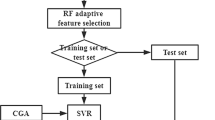Abstract
Urban traffic signal control is an important part of modern intelligent transportation system. Traffic lights play an important role in regulating traffic flow at intersections and major road sections. How to use advanced control technology to achieve reasonable time allocation optimization of traffic lights, maximize the use of traffic time for traffic lights, and ensure smooth roads is one of the key contents of intelligent transportation research. This paper aims to study the intelligent traffic signal control system (ITSCS) based on machine learning algorithm. This paper analyzes the support vector machine algorithm in the machine learning algorithm, and analyzes the advantages and disadvantages of the support vector machine algorithm. It also analyzes the hardware structure of the ITSCS and the communication process between the devices of the ITSCS. Finally, the experimental results are obtained. The empirical analysis results show that the traditional ITSCS becomes more concise and convenient after the machine learning algorithm is adopted, and we conducted a questionnaire and found that more than 87% of the people feel that the design of the ITSCS applies machine learning algorithm, and found that the design efficiency has become higher.
Access this chapter
Tax calculation will be finalised at checkout
Purchases are for personal use only
Similar content being viewed by others
References
Gu, J., Yin, M., Wang, L.: Research on greenhouse intelligent control system based on genetic optimization fuzzy PID Algorithm. Revista De La Facultad De Ingenieria 32(14), 382–388 (2017)
Zhou, Y., Fadlullah, Z.M., Mao, B.: A deep-learning-based radio resource assignment technique for 5G ultra dense networks. IEEE Netw. 32(6), 28–34 (2018)
Fang, C.: Intelligent online teaching system based on SVM algorithm and complex network. J. Intell. Fuzzy Syst. 40(5), 1–11 (2020)
Liu, J., Lin, L., Liang, X.: Intelligent system of English composition scoring model based on improved machine learning algorithm. J. Intell. Fuzzy Syst. 40(2), 2397–2407 (2021)
Huang, T., Poddar, S., Aguilar, C., et al.: Building Intelligence in the Automated Traffic Signal Performance Measures with Advanced Data Analytics. Trans. Res. Record J. Transportation Res. Board 2672(18), 154–166 (2018)
Liu, D.: Design of wireless sensor intelligent traffic control system based on K-means algorithm. Revista de la Facultad de Ingenieria 32(12), 354–362 (2017)
Tong, M., Duan, H., Luo, X.: Research on short-term traffic flow prediction based on the tensor decomposition algorithm. J. Intell. Fuzzy Syst. 40(2), 1–11 (2020)
Wang, X.Y.: Research on hydraulic control system of Jumbolter based on intelligent mix optimization algorithm. Int. J. Control Autom. 9(9), 163–170 (2017)
Du, J.: Research on Intelligent Tourism Information System Based on Data Mining Algorithm. Mob. Inf. Syst. 2021(1), 1–10 (2021)
Li, H., Zhang, S., Shi, J., et al.: Research and design of intelligent learning system based on recommendation technology. Control Intell. Syst. 47(1), 43–49 (2019)
Wang, J., Luo, Y., Gan, X., et al.: Intelligent traffic control system design based on fuzzy algorithm. IPPTA: Quarterly J. Indian Pulp a Paper Tech. Assoc. 30(6), 182–189 (2018)
Lin, L., Liu, J., Zhang, X., et al.: Automatic translation of spoken English based on improved machine learning algorithm. J. Intell. Fuzzy Syst. 40(2), 2385–2395 (2021)
Author information
Authors and Affiliations
Corresponding author
Editor information
Editors and Affiliations
Rights and permissions
Copyright information
© 2023 The Author(s), under exclusive license to Springer Nature Singapore Pte Ltd.
About this paper
Cite this paper
Wang, J. (2023). Intelligent Traffic Signal Control System Based on Machine Learning Algorithm. In: Atiquzzaman, M., Yen, N.Y., Xu, Z. (eds) Proceedings of the 4th International Conference on Big Data Analytics for Cyber-Physical System in Smart City - Volume 2. BDCPS 2022. Lecture Notes on Data Engineering and Communications Technologies, vol 168. Springer, Singapore. https://doi.org/10.1007/978-981-99-1157-8_2
Download citation
DOI: https://doi.org/10.1007/978-981-99-1157-8_2
Published:
Publisher Name: Springer, Singapore
Print ISBN: 978-981-99-1156-1
Online ISBN: 978-981-99-1157-8
eBook Packages: Intelligent Technologies and RoboticsIntelligent Technologies and Robotics (R0)




